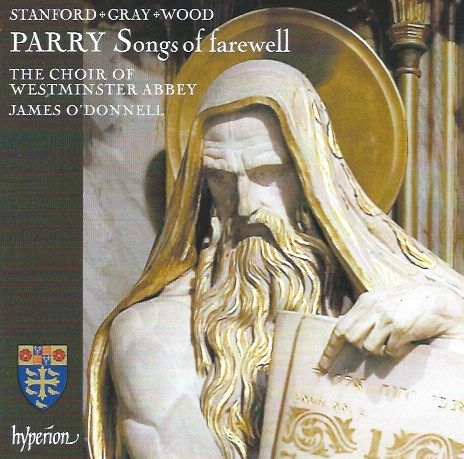Parry's Songs of Farewell from Westminster

As we say goodbye to 2020, it seems only right to bring in the Songs of Farewell by Hubert Parry in this wonderful release from the Choir of Westminster Abbey and James O'Donnell.
I well remember attending the recording sessions for this disc, held at All Hallows, Gospel Oak, London in late May 2019. That the disc exudes such beauty is in itself a little miracle: the morning trains had been completely stuffed up that day, and those not coming in cars were arriving either late, harried or both (myself included).
The sound of the Abbey Choir though, from the first note was radiant. This is a superb recording, courtesy of Adrian Peacock (producer) and David Hinitt (engineer). Also in attendance was Peter Holder, assistant organist at
the Abbey, who seemed to have an encyclopaedic an invaluable knowledge of the boys’ individual voice characteristics - “He’s right in the Cathedral’s bloodstream,” as Peacock put it to me.
Here's a taster:
The disc centres around Parry’s biggest unaccompanied choral piece, Songs of Farewell, one of that composer's very last compositions. Sharing disc space
with this masterpiece was Alan Gray’s short Magnificat and Nunc dimittis in F minor (Gray, 1855-1935, was organist at Trinity College,Cambridge from 1893-1930), Stanford’s Three Latin Motets, Op. 38 and Magnificat in B flat, Op. 164, Charles Wood’s Nunc dimittis.
Interestingly, this is not the only performance of the Parry Songs of Farewell in the Hyperion catalogue: St George’s Chapel Choir, Windsor Castle recorded it on a disc issued in 1993 (an all-Parry disc). But the rapport between conductor James O'Donnell and Adrian Peacock, a fine bass singer himself, is a defining factor in the performances' success: O’Donnell was Peacock’s boss at Westminster from 1988-96. “So I know what makes him tick,”says Peacock. “I’d like to think we have found a way of working in that I understand what his values are and I have to be able to answer the question ‘Have we got it?,’ in the middle of a session when we’re against the clock, very quickly.”
One of the toughest pieces seemed to be the Parry setting of John Donne, “From the Round Earth’s imagined corners” (Songs of Farewell), with its beautiful echoing phrases; it was negotiated with ease, the result of the utmost beauty and purity. The Parry Songs of Farewell is distinguished by its impeccably crafted polyphony; the performance, as the disc will show, is revelatory in this respect. Its bedfellows complement and enhance its beauty. Easy to see, too, how All Hallows, Gospel Oak is a favoured recording venue, its acoustic beautifully supportive of the choir’s sound.
